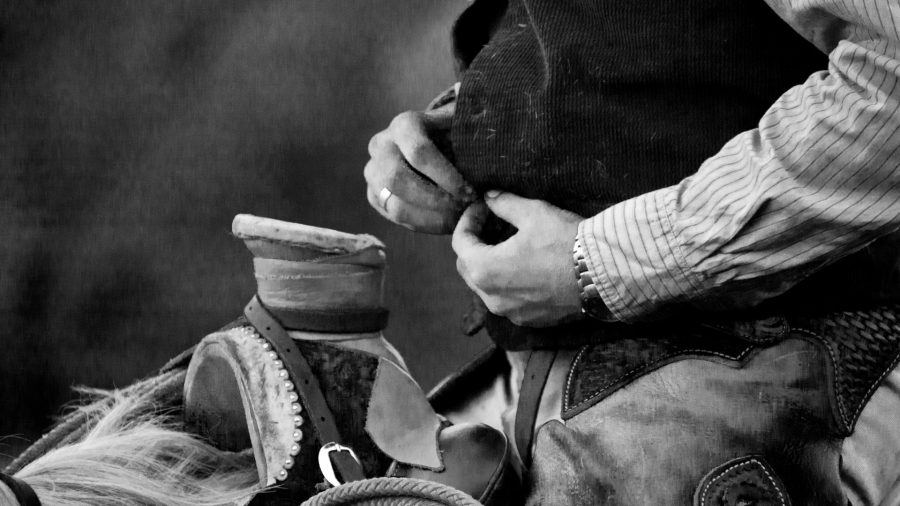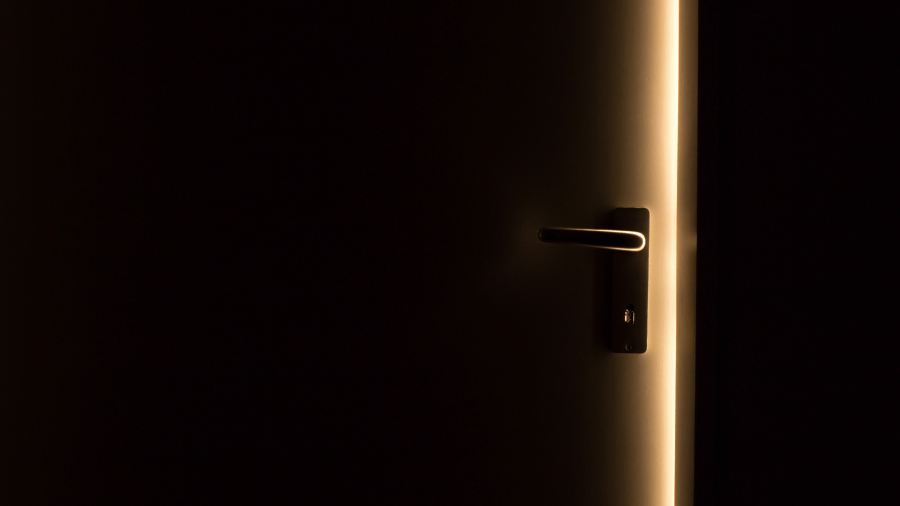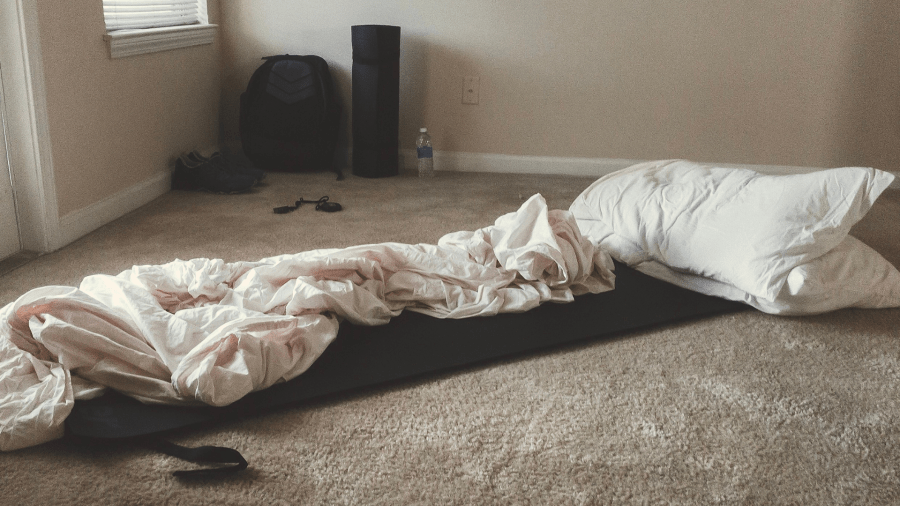It all started with these pains deep in her eye sockets. From there, a tightness would snake into her temples before settling in the back of her head. She felt people’s piercing gazes on her, assessing and questioning. She dropped out of her courses and got an office job, but the pain didn’t seem to go away. Her mornings were spent willing herself to get out of bed.
When she quit her job, the throbbing stayed with her. She moved into the family cabin, tucked away at the edge of a pine forest. She didn’t leave the house much besides a daily walk to the local shop to get the paper—there was no phone line and the TV reception was sporadic, amounting to three different channels that all showed the same shows where the people said the same things.
One day, she read an article in the paper about a young man who had won a novel-writing competition. He was only two years older than her. He was asked how someone so young could come up with a work so deep and meaningful. The young man listed a number of inspiring writers the girl had never heard of. He said he’d gone through a very difficult time in his life. ‘But what really changed me was the Museum of Darkness,’ he said. ‘It’s in England. A bit of a journey from London but well worth the effort.’
She found out that the museum had opened when she was at school. It was popular then, but nobody had written about it in recent years. Yet, according to the museum’s website, it was still going and free to enter. She used what was left of her savings to book a plane ticket.
* * * *
The Museum of Darkness wasn’t easy to get to. You either had to drive along winding, gravel-strewn roads, or walk five miles from the nearest village with a train station. In the initial bubble of excitement, when many people made their way there, they travelled by taxi. It was busy enough that there would always be somebody to pick you up on the way back. But that was then, and this is now.
Nobody sees the girl walking up the road. She takes a small digital camera from her backpack and photographs the front of the building: concrete walls with a vaguely cubist texture forming little turrets, and balconies jutting out full of lush green vegetation. There are many windows on different levels, but it’s hard to gauge what lies beyond them. The girl doesn’t venture off the narrow path that leads to the entrance. She observes her reflection as she approaches the large tinted-glass sliding doors. She can’t bring herself to look away from the two hollows in the middle of her sunlit face. She stops and takes a photo.
The doors slide open when she comes within an arm’s reach. In front of her, another wall of darkened glass. She steps inside and the doors behind her close, trapping her in the narrow space. When she glances over her shoulder, she can still see the outside. With slight unease, she realizes she might be watched through the set of doors in front of her, just as she can look at the rose bush growing alongside the path she has taken.
“Welcome to the Museum of Darkness,” a voice rings out. “Please switch off your mobile phones.”
She can’t tell where it’s coming from and whether it belongs to a man or a woman. It has the metallic twang of a robot but with a tone to it, something subtle, almost mocking. She hasn’t turned on her phone since she landed. She checks it just in case.
“Please mind your step in the dark,” the voice says as the second set of doors in front of her open.
When she walks into the darkness, she discovers she can’t see through the layer of glass that has closed behind her. She’s caught by a sound. A rustling? No, a shuffling. There are waves nearby. And the sea breeze—she’s sure she can smell salt and algae. The ground underneath her feet crumbles like sand. She starts moving towards the waves but stops after a while for fear of hitting a wall. She reaches out a tentative arm. The wall isn’t there. Yet, she can feel the warmth radiating from it, an uneven rock surface heated by the sun. It’s close enough, so she’d better turn left.
The air is damper now. Her thin top clings to her back despite the relative chill. She recalls being in the cellar with her grandmother, removing sprouts from the potatoes. They sat on small stools, her thumb growing calloused from pushing the growths off the surface of the icy-cold vegetables. Her grandmother was telling her a story. That’s when the honking starts.
She jumps to the side, expecting the glare of headlights to illuminate everything in a second. Instead, she hears the clatter of tracks, catches a whiff of something bitter, exhaust-like. She moves away from it and her hand brushes against a flaky tree trunk. A man’s voice is calling out in the distance. The floor underneath her feet dips and squelches besides the occasional sharp crunch of twigs or acorns. There are others around her now, with their tentative footsteps and quiet breathing.
She smells burning, heavy and musky. The smoke stings her eyes. Something falls on her face: little feathery touches run across her skin. She tries to brush them away and detects an earthy odour, of tobacco, something herbal. By instinct, she navigates the corridors of the block of flats. The sound of a distant TV, a child wailing a few doors down, the scent of onions and spices cooking in the kitchen. She hears whispers, a giggle. Somebody takes her hand, squeezes it as they climb the stairs. Then, the hand is gone and she’s grasping at emptiness.
“Are you here?” she asks when she stops, one foot poised in the air. Her voice echoes back at her. She takes tentative steps in one direction, then another. The door! She remembers reading something about an emergency door. Were there stairs leading up to it? She only skimmed old articles about the museum because she didn’t want them to spoil her experience. She lowers herself to the floor and is surprised by the warmth of it.
The floor eventually leads to something solid and rough to the touch. She slides her palm along the wall until she feels a little blister. It’s a small rubber ball, or maybe a large piece of gum someone had left behind. She pokes at it with her index finger. At first, nothing happens when she pushes it. But gradually, the darkness around her begins to hum. Overhead lights blink on one by one, illuminating a vast space painted a soft grey, with clean walls and a shiny floor. By the far corner, a narrow red door bears a sign that says: EXIT.
* * * *
You came from where you came from. You came to leave behind what you no longer needed, the parts that kept you tethered to your fear and grief. The darkness in the museum grows every year, but its walls stand firm.
Nobody sees the girl leave the museum. For a while, she stands by the exit door squinting up at the sky. She wonders how many hours or days have passed since she has last looked at it. Then, she adjusts her backpack and begins her walk back to the village.
Helen Harjak was born in Estonia, studied literature and philosophy in Scotland, and now lives in London, where she works as a freelance journalist and copyeditor. In 2021, she was chosen to participate in A Brief Pause, a professional development program for short fiction writers, run by Dahlia Books. Her work has been published in Visual Verse, Fudoki Magazine, and the anthology Small Good Things.








